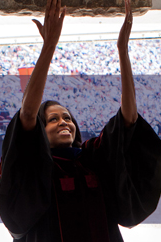
East County News Service
November 18, 2014 (San Diego)--First Lady Michelle Obama gave a video welcoming message at a White House-sponsored conference designed to help high school counselors motivate more students to get college degrees. A similar event was recently held at Harvard University.
The First Lady told those present, “I know that if we truly want to help our young people reach their college dreams, we need to support our school counselors. Our young people have so much potential, and they need someone in their lives who (believe) in them, and who can show them the steps they need to take to get to college.”
About 600 counselors and other educators from 30 states participated in the conference, including some who watched a video remotely, Times of San Diego reported.
President Barack Obama recently rolled out a plan to help reduce student debt and remove barriers to higher education. Other conference speakers included representatives of the White House’s College Opportunity Agenda and the First Lady’s Reach Higher Initiative as well as representatives from the U.S. Department of Education.
The Reach Higher initiative is the First Lady's effort to inspire every student in America to take charge of their future by completing their education past high school, whether at a professional training program, a community college, or a four-year college or university.
The White House College Opportunity Agenda is a 100-point program that strives to help students, especially those from low-income households, attain higher education. Without college, a child born in the bottom economic quintile has only a 5 percent chance of making it to the top quintile. However, the chance of making it to the top nearly quadruples with a college degree – creating a nearly equal chance of making it to the top quintile as staying in the bottom quintile. Yet only 9 percent of those born in the bottom quartile attain a bachelor’s degree by age 25, compared to 54 percent in the top quartile. According to the White House, improving college success is one of the most powerful tools to increase economic mobility and reduce inequality.








Comments
But..